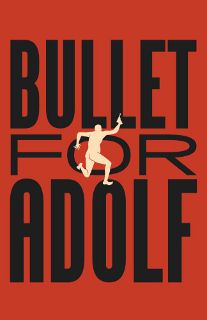FUN, FRIVOLOUS, FLAMBOYANT, ANDÂ FULLY FORGETTABLE
The remarkable thing about Bullet for Adolf, the new play written by Woody Harrelson and Frankie Hyman, is how entertaining it is despite its many shortcomings. Numerous jokes, believable dialogue, likeable characters, fun physical humor, and a soundtrack and popular video images from the 1980’s all make for an amusing spectacle. The creators and the actors all appear to be  having a lot of fun, and that good-time atmosphere infects the audience, but one could venture a guess that if the show’s creators had a little less fun realizing Bullet for Adolf, they might have ended up with a much better play.
Set in 1983 Houston, the play revolves around the friendship that develops between white Midwesterner Zach (Brandon Coffey) and black Harlem transplant Frankie (Tyler Jacob Rollinson), both of whom work at a construction site run by Jurgen (a delightfully dry Nick Wyman). After Zach unintentionally gets Frankie evicted, he invites his new friend to move into the house he shares with his childhood buddy, the sexually ambiguous Clint (David Coomber). What follows is a thin, meandering plot filled in with casual dialogue and jokes that are hit-and-miss.
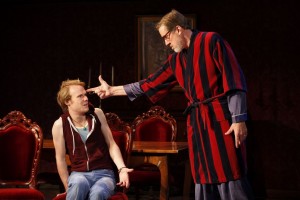 The play ultimately becomes a series of scenarios where any dramatic potential that exists goes unrealized. We see Frankie become enamored with Shareeta (Marsha Stephanie Blake), a young black woman who’s made it out of the ghetto on the strength of her education. We meet Shareeta’s sassy friend Jackie (Shamika Cotton), a psychologist who works with troubled children and makes a living in the ghetto—a point of pride. We encounter Batina (Shannon Garland), Jurgen’s daughter and Zach’s ex-girlfriend, who invites Zach and the gang to her father’s home for her 18th birthday party, including Dago-Czech (Lee Osorio), a man of Italian and Czechoslovakian descent who acts like a black guy from the ghetto.
The play ultimately becomes a series of scenarios where any dramatic potential that exists goes unrealized. We see Frankie become enamored with Shareeta (Marsha Stephanie Blake), a young black woman who’s made it out of the ghetto on the strength of her education. We meet Shareeta’s sassy friend Jackie (Shamika Cotton), a psychologist who works with troubled children and makes a living in the ghetto—a point of pride. We encounter Batina (Shannon Garland), Jurgen’s daughter and Zach’s ex-girlfriend, who invites Zach and the gang to her father’s home for her 18th birthday party, including Dago-Czech (Lee Osorio), a man of Italian and Czechoslovakian descent who acts like a black guy from the ghetto.
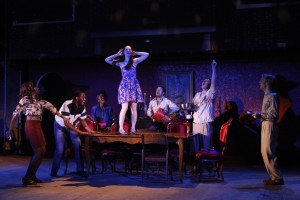 You can say fuh-ghetto-boutit to all these set-ups because nothing sticks. We never get the sense it’s all that important for Frankie to get a job (his interactions with Shareeta are clever but unmoving). Zach doesn’t really care about Batina, nor does she care all that much about him. And when Jurgen, a German whose father was a high ranking officer in the Reich, reveals himself to be a Nazi apologist, it’s used for some mild confrontations, but no more. And since all of the characters have been written as being fine just the way they are, none of them really need anything, so forget dramatic structure. In fact, the first dramatic event of any consequence happens at the climax of the first act, about an hour and ten minutes into the play, and the sense is that everything leading up to it could have been accomplished in half the time.
You can say fuh-ghetto-boutit to all these set-ups because nothing sticks. We never get the sense it’s all that important for Frankie to get a job (his interactions with Shareeta are clever but unmoving). Zach doesn’t really care about Batina, nor does she care all that much about him. And when Jurgen, a German whose father was a high ranking officer in the Reich, reveals himself to be a Nazi apologist, it’s used for some mild confrontations, but no more. And since all of the characters have been written as being fine just the way they are, none of them really need anything, so forget dramatic structure. In fact, the first dramatic event of any consequence happens at the climax of the first act, about an hour and ten minutes into the play, and the sense is that everything leading up to it could have been accomplished in half the time.
Directed by Mr. Harrelson, Bullet for Adolf isn’t a thoughtful play, basically because the set-up is so misleading. Even the title is misleading. The juxtaposition of the heavy word “Adolf†(calling to mind fascism, war, and genocide)  against “bullet†(suggesting perhaps some violent and heroic act of rebellion) is incongruous with the weight of the themes in the play, making the title’s connection to the proceedings as trivial as the proceedings.
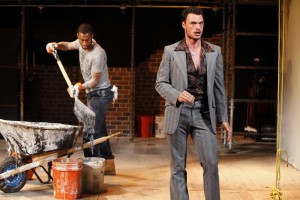 The action on the stage has nothing to link it to the 1980’s, so video images are projected during the all too frequent scene changes. Plot points are left dangling. The stakes never seem very high, nor does one get the sense that anything truly bad can happen to anyone. In general, the script feels like it’s made up of big, awkward blocks of action, as opposed to a collection of interlocking links that create a naturally evolving chain of events. The problematic dramatic construction also hinders the humor: some of the jokes are too cheap to be funny, while others—the good ones—could seriously benefit from being executed by characters with more chiseled motivations. And yet, some of the show is very entertaining—that is, until it’s over, at which time you can’t remember what it was that made you smile.
The action on the stage has nothing to link it to the 1980’s, so video images are projected during the all too frequent scene changes. Plot points are left dangling. The stakes never seem very high, nor does one get the sense that anything truly bad can happen to anyone. In general, the script feels like it’s made up of big, awkward blocks of action, as opposed to a collection of interlocking links that create a naturally evolving chain of events. The problematic dramatic construction also hinders the humor: some of the jokes are too cheap to be funny, while others—the good ones—could seriously benefit from being executed by characters with more chiseled motivations. And yet, some of the show is very entertaining—that is, until it’s over, at which time you can’t remember what it was that made you smile.
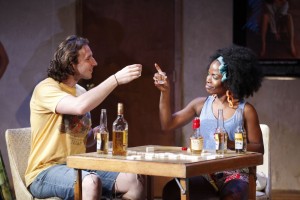 And what’s with the volume from the actors? A number of them, especially Mr. Osorio, Mr. Rollinson, and at times Ms. Garland, are so loud, they’re nearly yelling. Is this direction Mr. Harrelson’s way to try and make up for the lack of drama in the writing? Or to ensure the audience hears all the jokes? It’s not clear. Whatever the reason, the result is quite odd. Also peculiar is Mr. Coomber’s performance. He seems to be doing some sort of imitation of the over-the-top, loony Will Ferrell. This might have worked under different circumstances but in this production it just feels shtick-y.
And what’s with the volume from the actors? A number of them, especially Mr. Osorio, Mr. Rollinson, and at times Ms. Garland, are so loud, they’re nearly yelling. Is this direction Mr. Harrelson’s way to try and make up for the lack of drama in the writing? Or to ensure the audience hears all the jokes? It’s not clear. Whatever the reason, the result is quite odd. Also peculiar is Mr. Coomber’s performance. He seems to be doing some sort of imitation of the over-the-top, loony Will Ferrell. This might have worked under different circumstances but in this production it just feels shtick-y.
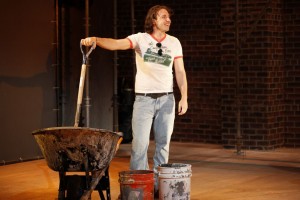 My guess is that the writers of Bullet for Adolf weren’t really concerned with the themes they vaguely bring up in the play, including prejudice, fascism, personal identity, transcendence of humanity, and the nuances and ironies of racism. Rather they appear more interested in the time the two of them spent in Houston and the people they met there (Zach and Frankie clearly serve as Mr. Harrelson’s and Mr. Hyman’s dramatic incarnations). Their goal seems to be to share that experience with us. And to an extent they succeed. For all that the show lacks dramatically, thematically, intellectually and comedically, it’s nevertheless infused with a carefree, youthful energy, mixed with a bit of nostalgia, which makes it entertaining, if ultimately less than satisfying.
My guess is that the writers of Bullet for Adolf weren’t really concerned with the themes they vaguely bring up in the play, including prejudice, fascism, personal identity, transcendence of humanity, and the nuances and ironies of racism. Rather they appear more interested in the time the two of them spent in Houston and the people they met there (Zach and Frankie clearly serve as Mr. Harrelson’s and Mr. Hyman’s dramatic incarnations). Their goal seems to be to share that experience with us. And to an extent they succeed. For all that the show lacks dramatically, thematically, intellectually and comedically, it’s nevertheless infused with a carefree, youthful energy, mixed with a bit of nostalgia, which makes it entertaining, if ultimately less than satisfying.
photos by Carol Rosegg
Bullet for Adolf
New World Stages in New York City
closes on September 30, 2012
for tickets, visit http://www.bulletforadolf.com/
